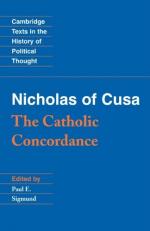|
This section contains 7,667 words (approx. 26 pages at 300 words per page) |

|
SOURCE: Duclow, Donald F. “Mystical Theology and Intellect in Nicholas of Cusa.” American Catholic Philosophical Quarterly 64, no. 1 (Winter 1990): 111-29.
In the following essay, Duclow discusses how Cusanus uses the notion of learned ignorance to link mystical thought and intellectual thought. Focusing on De Docta Ignorantia, Apologia Doctae Ignorantiae, De Visione Dei, and De Filiatione Dei, Duclow shows how Cusanus moves beyond the mystical theology of Dionysius and Eckhart.
Mystical theology and intellect may seem ill matched, if we limit mysticism to emotional rapture and visionary experience. Yet they form a consistent—indeed, inseparable—pair for many medieval thinkers. Nicholas of Cusa places intellect at the center of his mystical theology, as he links learned ignorance with mystical vision and filiatio or sonship. This essay will trace these themes in De docta ignorantia, in Nicholas's response to Johannes Wenck's criticism, in De visione Dei's discussion of mystical theology...
|
This section contains 7,667 words (approx. 26 pages at 300 words per page) |

|


